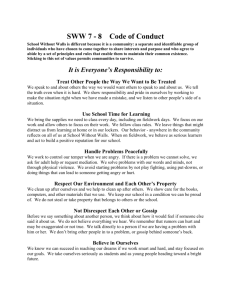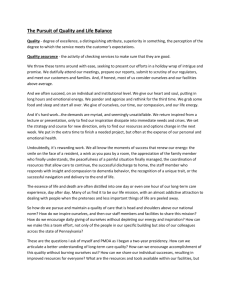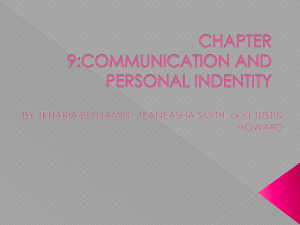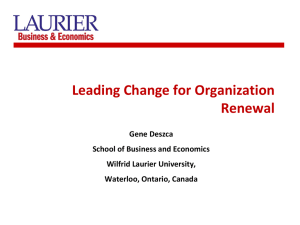BP8_L07
advertisement
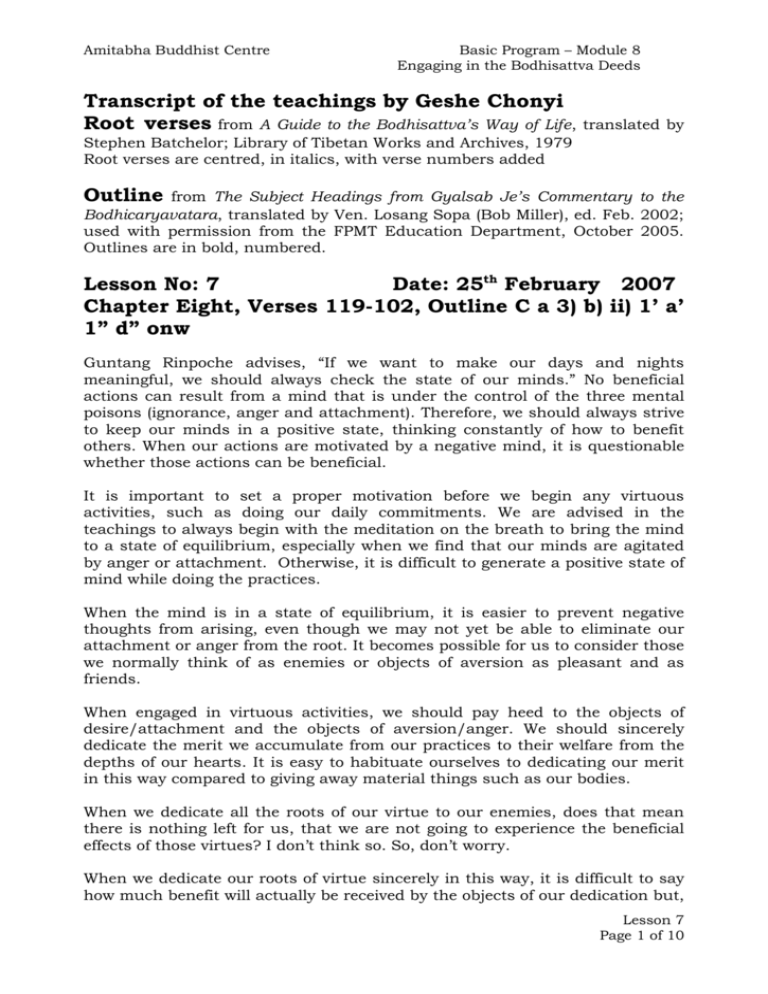
Amitabha Buddhist Centre Basic Program – Module 8 Engaging in the Bodhisattva Deeds Transcript of the teachings by Geshe Chonyi Root verses from A Guide to the Bodhisattva’s Way of Life, translated by Stephen Batchelor; Library of Tibetan Works and Archives, 1979 Root verses are centred, in italics, with verse numbers added Outline from The Subject Headings from Gyalsab Je’s Commentary to the Bodhicaryavatara, translated by Ven. Losang Sopa (Bob Miller), ed. Feb. 2002; used with permission from the FPMT Education Department, October 2005. Outlines are in bold, numbered. Lesson No: 7 Date: 25th February 2007 Chapter Eight, Verses 119-102, Outline C a 3) b) ii) 1’ a’ 1” d” onw Guntang Rinpoche advises, “If we want to make our days and nights meaningful, we should always check the state of our minds.” No beneficial actions can result from a mind that is under the control of the three mental poisons (ignorance, anger and attachment). Therefore, we should always strive to keep our minds in a positive state, thinking constantly of how to benefit others. When our actions are motivated by a negative mind, it is questionable whether those actions can be beneficial. It is important to set a proper motivation before we begin any virtuous activities, such as doing our daily commitments. We are advised in the teachings to always begin with the meditation on the breath to bring the mind to a state of equilibrium, especially when we find that our minds are agitated by anger or attachment. Otherwise, it is difficult to generate a positive state of mind while doing the practices. When the mind is in a state of equilibrium, it is easier to prevent negative thoughts from arising, even though we may not yet be able to eliminate our attachment or anger from the root. It becomes possible for us to consider those we normally think of as enemies or objects of aversion as pleasant and as friends. When engaged in virtuous activities, we should pay heed to the objects of desire/attachment and the objects of aversion/anger. We should sincerely dedicate the merit we accumulate from our practices to their welfare from the depths of our hearts. It is easy to habituate ourselves to dedicating our merit in this way compared to giving away material things such as our bodies. When we dedicate all the roots of our virtue to our enemies, does that mean there is nothing left for us, that we are not going to experience the beneficial effects of those virtues? I don’t think so. So, don’t worry. When we dedicate our roots of virtue sincerely in this way, it is difficult to say how much benefit will actually be received by the objects of our dedication but, Lesson 7 Page 1 of 10 Amitabha Buddhist Centre Basic Program – Module 8 Engaging in the Bodhisattva Deeds without a doubt, we will benefit and see the improvement in our minds. We will definitely benefit because we can see that all our problems and sufferings arise from attachment and/or anger in our lives. When we neglect checking the state of our minds, then no matter how profound or extensive our prayers may be, it is difficult for those practices to be beneficial even for ourselves. When we do not benefit from our practices, then it is difficult for us to benefit others. If you wish, however, to make your life meaningless and empty, then by all means, please continue to spend your whole life being conceited and arrogant and spend your time partying, gossiping and shopping. So to reiterate the advice from Guntang Rinpoche –“If you want to make your life meaningful day and night, always check the state of your mind. If you wish to make your life meaningless and empty, then you can spend your time in meaningless activities and abide in arrogance and so forth.” We should always remind ourselves of this advice. b) The way to exchange self and other i) A brief presentation ii) An extensive explanation 1’ Explaining the way to exchange self and other a’ An extensive explanation 1” Familiarizing oneself with cherishing others a” The capacity to exchange self and other and the pacification of conceit b” Instructions on making effort in this meditation without looking to the fullyripened [effect] c” Doing more for the sake of others d” One will be able to develop [such an attitude] if one familiarizes oneself with it e” One should meditate on exchanging self and others with the desire to free both self and others from suffering d” One will be able to develop [such an attitude] if one familiarizes oneself with it (8, 119) I should not turn away from what is difficult; For by the power of familiarity, I may be made unhappy even when someone Whose name once frightened me is not around. Qualm: Exchanging self and other, cherishing others and so forth – these practices are very beneficial but they are too difficult. Answer: Even if we think like this, we should not stop ourselves from wanting to train in these practices because all we need is familiarity. Once we are familiar with the practice, it definitely becomes possible. Think of someone we dislike or someone we are afraid of. It is possible that, over time, that person may become a friend, even a good friend. It can happen. When that person becomes our close friend, we will feel lonely and unhappy when he is not around. Our attitude may completely change. Lesson 7 Page 2 of 10 Amitabha Buddhist Centre Basic Program – Module 8 Engaging in the Bodhisattva Deeds Shantideva says that just as it seems impossible to us now that an enemy can become a close friend, through familiarity, that change can come about. In the same way, although we may think now, “It is difficult to see myself as other,” it is possible, through practice and familiarity, for our attitude to change. The point here is not to turn away from the practice because we deem it to be too difficult. When we do nothing, then nothing positive can be accomplished. e” One should meditate on exchanging self and others with the desire to free both self and others from suffering (8,120) Thus whoever wishes to quickly afford protection To both the self and other beings Should practice that holy secret: The exchanging of self for others. Since it is possible to develop the attitude of exchanging self and other through familiarity, we who seek protection (i.e. to free ourselves from the extremes of nirvana and samsara), should practise this holy secret - the instruction of exchanging self and other. Why is this instruction secret? Because it should not be revealed to someone whose Mahayana lineage has yet to awaken. In other words, those who are of the Hearers and Solitary Realisers lineages are not suitable vessels for these instructions. Why is this instruction holy? Because the practice of exchanging self and other is the ultimate practice of the Mahayana or the Great Vehicle. 2” Making effort to abandon self-cherishing a” Self-cherishing is the cause of all fear b” Reflecting on how [self-cherishing] act to encourage one into all negative conduct a” Self-cherishing is the cause of all fear (8,121) Because of attachment to my body, Even a small object of fear frightens me. So who would not revile, as an enemy, This body that gives rise to fear? We develop strong attachment towards our bodies due to our self-grasping. As a result, even small problems can cause great mental suffering for us. For example, we are afraid of tiny mosquitoes and insects, worrying about how they can harm us. When a fly lands on our food, we fret over how we will get sick if we eat the food so we throw the food away. These worries and fears arise from our strong attachment to our bodies. When we are afraid of small things, it stands to reason that we will be even more afraid of sickness, old age and death. Since it is our self-grasping that gives rise to this strong attachment, selfgrasping is the cause of all our fears and problems in this life and our future lives. Lesson 7 Page 3 of 10 Amitabha Buddhist Centre Basic Program – Module 8 Engaging in the Bodhisattva Deeds Due to our attachment to the body, all sorts of problems arise. If the body is the source of all our fears and suffering, then why would a wise person want to remain attached to it? Instead of cherishing our bodies, we should see them as our enemies. b” Reflecting on how [self-cherishing] act to encourage one into all negative conduct (8,122) By wishing for a means to remedy The hunger, thirst and sickness of the body, I might kill birds, fish and deer And loiter by the sides of roads (to rob others). (8,123) If, for the sake of its profit and comfort, I would kill even my father and mother, And steal the property of the Triple Gem, Then I would undoubtedly proceed to burn in the flames of the deepest hell. (8,124) Therefore what adept would desire, Protect and venerate this body? Who would not scorn it And regard it as an enemy? In order to stop ourselves from experiencing the sufferings of hunger, thirst and sickness, we may do many negative things such as even killing our parents, stealing from the Triple Gem and other non-virtuous actions. To satisfy the attachment to our bodies, we engage in negative actions that will lead us only to a rebirth in the Avici hell. If that is the case, what wise person would venerate this body, which is the source of all our difficulties? Who is the “adept” mentioned here? It is someone who wants to achieve the happiness of this and future lives, not someone who only focuses on temporal happiness. We must work at stopping the self-cherishing attitude, because it is the cause of all our faults and it will only bring us problems in this life and our future lives to come. Question from student: How do we tell the difference between caring for and being attached to our bodies? Reply: We need to check whether taking care of our bodies brings us problems or leads to the creation of negative karma. When we fuss over and are totally preoccupied with the care of our bodies, then that’s a sign that we are attached to our bodies. There is a need to take care of our bodies, especially when we are using it to practise the Dharma. When we take care of the body with that motivation, does that increase our attachment or not? If it increases our attachment, it defeats Lesson 7 Page 4 of 10 Amitabha Buddhist Centre Basic Program – Module 8 Engaging in the Bodhisattva Deeds the purpose of our Dharma practice. When the attachment becomes stronger, the self-cherishing and self-grasping attitudes will also become stronger. When self-cherishing increases, we forget about exchanging self and other. That is the problem. In examining the instructions of exchanging self and other, we have to see the faults of the self-cherishing attitude, the cause of all our problems. In order to stop this attitude, we have to reduce our attachment to ourselves and to our bodies. When our attachment is reduced, it becomes easier for us to embark on the practice of exchanging self and other. 3” Reflecting on the faults and benefits of primarily cherishing self and other [respectively] a” A list of the disadvantages and benefits of cherishing self and other [respectively] (1) An extensive explanation (a) In terms of giving (b) In terms of harming (c) In terms of praise and renown (d) In terms of application to activities (e) In terms of benefit and bliss (2) Synopsis b” Thus, the reasonableness of discarding self-cherishing (a) In terms of giving (8,125) "If I give this, what shall I (have left to) enjoy?"Such selfish thinking is the way of ghosts; "If I enjoy this, what shall I (have left to) give?” Such selfless thinking is a quality of the gods. We are unable to part with our wealth and possessions because of miserliness, thinking we will become poor or we won’t have anything left for ourselves. Miserliness is an affliction which can only lead to unpleasant fruitional results, such as a rebirth in a fearful place and is therefore not beneficial. Instead, we should think, “If I use up everything myself, I will have nothing to give others.” This way of thinking leads only to happiness from life to life, leading us to good rebirths, ultimately, to enlightenment and, “is a quality of the gods.” Miserliness and generosity are mental attitudes and do not depend on whether we actually give something away or not. If one is unable to part with one's possessions, then even if one has plenty to spare, that is miserliness. If one has the mental willingness to give away everything one owns, that is generosity. So it does not depend on the actual giving. (b) In terms of harming (8,126) If, for my own sake, I cause harm to others, I shall be tormented in hellish realms; But if, for the sake of others, I cause harm to myself, I shall acquire all that is magnificent. Lesson 7 Page 5 of 10 Amitabha Buddhist Centre Basic Program – Module 8 Engaging in the Bodhisattva Deeds We harm the bodies and possessions of others because of our self-importance, cherishing ourselves and putting our own interests first. These actions will only lead us to bad rebirths and suffering. On the other hand, it is not a problem if our bodies or possessions are harmed in the course of our working to free others from suffering and placing them in happiness because such actions will only lead to good rebirths and, ultimately, enlightenment. (c) In terms of praise and renown (8,127) By holding myself in high esteem I shall find myself in unpleasant realms, ugly and stupid; But should this (attitude) be shifted to others, I shall acquire honors in a joyful realm. Cherishing ourselves and being interested solely in our own welfare, desiring good looks, wealth and possessions, fame and high status – all these lead only to rebirth in the lower realms. Once there, we will be stupid and ugly and be surrounded only by unpleasant things. Shifting this attitude towards others – wishing them to have wealth, fame and material comforts – will lead us to a good rebirth, endowed with wealth and fame. We can see from the above verses the different results of different states of mind. One is beneficial. The other is not. As we always have our own interests at heart, thinking only of ourselves, we continue to circle in cyclic existence. (d) In terms of application to activities (8,128) If I employ others for my own purposes, I myself shall experience servitude; But if I use myself for the sake of others, I shall experience only lordliness. When we treat others like slaves or servants to do our bidding, we are only creating the cause to experience the same fate ourselves in the future. However, when we place ourselves in the service of others, working only for their benefit, we will experience a good rebirth, be born in a family of good lineage and high status, be endowed with a pleasant appearance and wield power and influence as a king or minister. (e) In terms of benefit and bliss (8,129) Whatever joy there is in this world Lesson 7 Page 6 of 10 Amitabha Buddhist Centre Basic Program – Module 8 Engaging in the Bodhisattva Deeds All comes from desiring others to be happy, And whatever suffering there is in this world All comes from desiring myself to be happy. All the happiness of this worldly life and all future lives come from our wish for others to be happy. Desiring happiness for ourselves leads only to problems, difficulties and suffering in this and future lives. We should check and analyse whether what the text says makes sense or not. We need to investigate this at an individual level. When we think only of ourselves, does this generate profit or loss for us? When we think only of others, do we stand to lose or profit from this? We need to figure this out for ourselves. As mentioned earlier, when we look at the meaning of the “adept” or wise person, it does not refer to someone who concentrates on only a very small profit (or temporary happiness) but rather someone who focuses on the longterm view, the happiness of all the future lives to come. Such a person is not someone who considers only the happiness of a single hour, days or even months. A wise person is not like that. (2) Synopsis (8,130) What need is there to say much more? The childish work for their own benefit, The Buddhas work for the benefit of others. Just look at the difference between them Verse 130 is the summary of our discussion so far. Day and night, without break, even when we are sleeping, we have been harbouring this selfcherishing attitude. We think only of accomplishing our own purposes. What have we achieved so far and what is the result? The outcome is that we only engage in negative thoughts that lead to negative actions, the fruitional results of which are only suffering and problems. We go through life experiencing one problem after another, without break. Our selfish mental attitude leads to this kind of result. The buddhas and bodhisattvas, the great holy beings, spend their days and nights working only for the welfare of others. They do not experience any suffering or problems regardless of whatever form they may choose to manifest as or whatever rebirth they take. They experience continuous happiness, not only in that particular life but also in all their future lives, because they only cherish others. The advice here is for us to discard our self-interest and work solely for the benefit of others. The number of problems we experience depends on whether we are narrow- or broad-minded. When we are narrow-minded, we will be unhappy and have more problems. When the mind is vast and big, it will be more relaxed, happy and peaceful. The advice in the above verses is to help us Lesson 7 Page 7 of 10 Amitabha Buddhist Centre Basic Program – Module 8 Engaging in the Bodhisattva Deeds broaden our mental perspective beyond focusing on just ourselves but to include all living beings, to working for their benefit. 1,2 1 1’ Contemplating the benefits of exchanging self and other and the faults of not exchanging self and other Engaging in the Bodhisattva Deeds says: Whoever wishes to quickly protect Self and other Must exchange self for other. Practice this excellent secret And: Whatever worldly joy there is Arises from wishing for others' happiness. Whatever worldly suffering there is Arises from wishing for your own happiness. What need is there to say more? Look at the difference between these two: Ordinary persons act for their own welfare; The Sage acts for others' welfare. If you do not genuinely exchange Your own happiness for others' suffering, You will not achieve buddhahood, And even in cyclic existence, you will have no joy. Consider how being self-centered is the door to all suffering and being other-centered is the basis of all excellence. 2' The ability to exchange self and other if you accustom yourself to the thought of doing so Take the example of your enemy becoming a friend. At first, when you heard even the name of your enemy, fear arose. Later you were reconciled and became such close friends that when this new friend was absent you were very unhappy. This reversal resulted from familiarizing your mind with a new attitude. So likewise, if you become habituated to viewing yourself as you presently view others [with an attitude of neglect] and to viewing others as you presently view yourself [with a cherishing attitude], you will exchange self and other. Do not turn away from this difficulty. Although you were frightened upon hearing someone's name, Now, due to the power of conditioning, You dislike that person's absence. And also: It is not difficult to consider my body With the perspective I have toward another's body. Qualm: Since someone else's body is not your body, how can you develop the same attitude that you hove toward your own? Reply: Your body was produced from your father's semen and your mother's blood. Even though it was produced from portion of someone else's body, you conceive it to be your own by the influence of previous conditioning. Similarly, if you become accustomed to cherishing another's body as you presently do your own, you will view it with the same perspective that you now have toward your own body. Therefore just as you conceived ‘I’ With respect to the drops of semen Lesson 7 Page 8 of 10 Amitabha Buddhist Centre Basic Program – Module 8 Engaging in the Bodhisattva Deeds And blood of others, so you can be conditioned To cherishing others as you do yourself. Reflect thoroughly on the benefits of being other-centered and the faults of being self-centered. Thereby you will produce from the depths of your heart a great delight in meditating on the exchange of self and other. Then recognize that you can actually generate it once you have become habituated to it. (Lamrim Chenmo, Vol. 2, pgs. 51-53) 2 We think at first that being concerned about others is a difficult thing to achieve, and we conceive of it as a dangerous practice, almost as one of our enemies, whose mere name incites fear within us. As we familiarize ourselves with it, however, since our attitude toward him has changed, it will be almost as if our enemy has become an excellent friend, so that we even feel sad if he has to go away for awhile. [119] Once we have acquired the altruistic mind, we will behave as Buddha did in the stories of his previous lives. When he was still a bodhisattva and training in bodhichitta, the Buddha offered his body to a tiger. The place where this occurred can still be seen. Having more concern for others than for oneself is not unreasonable, and good reasons for this practice are explained in the following verses. Those who wish to liberate themselves and others from samsara should undertake the sacred pledge of exchanging themselves for others, the holy or noble "secret." [120] This pledge is something very profound, even burdensome in a sense, since it is not an easy thing for everyone to practice and achieve. On the other hand, the selfish mind, solely concerned with its own well-being, is the cause of all the suffering we experience. Attachment to the self is the cause of every negative action sentient beings perform, and there are examples that show this. First they have attachment to the self, followed by attachment to the body. To protect it from hunger, thirst, or various types of illness, they end up killing fish, birds, and other animals, or attacking people in order to rob them. For their own profit, they might even kill their parents or steal what belongs to the Three Jewels. As a result of these actions, they will proceed to burn in the flames of the deepest hell. [123] Some commit robbery and are caught by the police and put in jail. The sole root of all this is the attachment to the self. The same applies to an argument that degenerates and becomes so heated that it leads even to murder. In court cases, where each of the two parties claim to be right and want to win, or in arguments between parents and children, selfishness is once again the culprit. Couples' disagreements and separations, and con flicts between teachers and students or between gurus and disciples—all have their origins in a selfish attitude, which is solely concerned with and attached to personal benefit. Every problem and every mistake is born out of wanting for ourselves every advantage. However, if we transform this attitude and no longer wish to keep what is pleasant for ourselves, but instead offer it to others, all difficulties will disappear.' Whether or not we show a friendly face, whether or not we are kind, the right attitude is to benefit others. Usually it is a rarity to find someone in the world who behaves like this, but we have promised to practice the Mahayana teachings and tantra in particular, and therefore it is our responsibility to exchange ourselves for others. We should strive enthusiastically to offer every pleasant thing to them, and this habit will gradually increase in our mind. A wise man has no attachment or desire for his own body; he does not protect and gratify it. [124] If someone asks us to give them something that they need, and we think, "What will I be left with?" this type of mental attitude is similar to a demon's, and is called the "dharma of the Lesson 7 Page 9 of 10 Amitabha Buddhist Centre Basic Program – Module 8 Engaging in the Bodhisattva Deeds Translated by Ven. Gyurme Transcribed by Phuah Soon Ek, Vivien Ng & Angie Xiao, 24th March 2007 Edited by Cecilia Tsong, 1st April 2007 Checked by Fiona O’Shaughnessy, 1st April 2007 pretas." But if in the same situation, with no hesitation and with a pure altruistic thought, we give the requested object, this is called the "dharma of the gods." [125] If, in our own interest, we harm others, the result will be a rebirth in the realms of suffering, whereas if we experience difficulties in order to benefit others, it will be the cause of all happiness. [126] Holding ourselves in high esteem and thinking of ourselves as wealthier or of a higher social class, we will find ourselves reborn in unpleasant realms, and even if we are born as humans we will be stupid. But if we reverse this attitude, we will instead acquire the joys of a higher realm and receive honors and consideration from all. [127] Using others for one's own gain will result in having to serve in a future life, whereas putting ourselves at other people's service is the cause of being reborn into a higher social class, as an important person, or as a person in a position of power. [128] In short, any happiness in this world derives from our concern for others. We are all enjoying a human rebirth and this is the effect of a loving mind that has not caused harm but has been interested in and taken good care of others. Those who serve others will be respected and held in high esteem by all, will improve their social position, and, if one day they were to stand as candidates, they would be elected. Even the posts of prime minister or president therefore have consideration for others at their root. On the other hand, every suffering, fear, problem, or difficulty derives from the self-centered mind. Without giving much explanation, it suffices to look at this typically childish behavior and compare it with that of the buddhas, who instead work for the benefit of others. [130] The reason that we prostrate to, make offerings to, and worship any statue of Buddha, even if it is made of stone, is because his attitude was constantly altruistic. (The Way of Awakening by Geshe Yeshe Tobden, pg. 222-224) Lesson 7 Page 10 of 10


